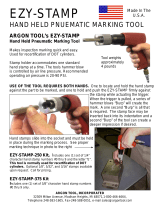Page is loading ...

INSTRUCTIONS for
F-14-237
December, 1995
R-50 SERIES
CONTROLLED FLOW CYLINDER REGULATORS
Regulator Gas Preset Nom. Connections (CGA)
Model P/N Service Flow Rate Inlet Outlet*
R-50-TIG-580 18361 Argon or 25 cfh 580 032
R-50-MIG-580 17773 Argon Mix 35 cfh
R-50-MIG-320 17774 CO
2
35 cfh 320 032
Be sure this information reaches the operator.
You can get extra copies through your supplier.
l CGA-032 (FORMERLY "B"I.G.)—5/8—18RH female.
Each regulator is equipped with 1-1/2-in. dia., 0-4000 psi cylinder pressure gauge.
Dimensions Weight: Overall length............................................... 4-1/4 to 4-3/4-in.
Body Diameter .......................................................... 1-1/4-in.
Weight............................................................................ 1 -lb.
Accessory: CO
2
Heater, P/N 950578 - Recommended if CO
2
regulator is expected to operate at high duty cycles.
The heater connects between regulator and cylinder permitting the CO
2
to flow without "freezing up" the regulator.
Requires standard electrical extension cord of appropriate length with 3-prong connections.
The INSTRUCTIONS contained on this sheet are intended specifically for operators who know the general principles of operation
and safe practices to be followed in operating this type of equipment. If you are not sure that you understand these principles
fully, we urge you to read our booklet "Precautions and Safe Practices for Arc Welding, Cutting and Gouging" Form 52-529, in
addition to these instructions. Do NOT permit untrained persons to install, operate, or maintain this equipment. Do NOT attempt
to install or operate this equipment until you have read and fully understand these instructions. If you do not fully understand
these instructions, contact your supplier for further information.
The regulators covered by these Instructions are listed by Underwriter's Laboratories only when using parts manufactured by The
ESAB Group to the specifications on file with Underwriter's Laboratories, Inc., and the gas service for which it is designed and
listed. The use of other parts voids the manufacturer's warranty.
F-14-237
l Do not change CGA inlet connection from number
stamped on regulator body.
l Follow operating instructions on this sheet.
l This regulator must be installed, operated and
maintained only by trained servicemen.
l For complete safety information on welding and
cutting equipment, read form 2035 (oxy-fuel gas)
and 52-529 (arc welding). For safety information
on gases, see your supplier.
TO CONNECT:
1. Open the cylinder valve slightly for an instant, and
then close it. This is known as cracking the valve.
This blows away and dirt or dust which may have
accumulated in the valve outlet. Be sure to keep
your face away from the valve outlet to protect your
eyes.
Do not clamp regulator cap in a vise or grip it with
a pair of pliers. Distortion of cap can jam the inter-
nal parts and cause excessively high delivery pres-
sure as well as weaken the threaded joint to the
regulator body. This may cause cap to fly off and
possibly injure personnel in area.
The regulators are not adjustable. They are fac-
tory set to deliver a fixed flow rate as specified in
the table above. Do not attempt to make any ad-
justments.
INERT GAS OR CARBON DIOXIDE can cause suf-
focation in confined spaces.
l Always work in well ventilated area.
l Prevent leaks.

1. Close the cylinder valve.
2. Release gas from the regulator by opening valve
downstream.
3. When pressure gauge reads zero, the regulator
may be removed from the cylinder.
INLET FILTER MAINTENANCE
Each regulator is equipped with a porous metal inlet
filter, P/N 71Z33, pressed into the regulator inlet nipple.
No regulator should be connected to a cylinder or sta-
tion valve unless it contains this filter. You can replace
the filter if you have reason to do so. To remove a
filter, insert a No. 1 "EZY-OUT" or a No. 6 wood screw
(about 2-in. long) into the filter and pull it out. Carefully
press the new filter into the nipple with a 1/4-in. round
metal rod.
REPAIR SERVICE
If gas is escaping through the safety release device, or
if any leakage was noted, the regulator should be re-
turned to your distributor or to ESAB Remanufacturing
Center, 411 S. Ebenezer Road, Florence, SC 29501.
If you have your own properly equipped and staffed
repair facility, repair parts information for this regulator
(Form 14-239) is available on request to your distribu-
tor.
NOTE: Safety release device equipped on these regu-
lators is designed for regulator protection; not
for hose or equipment downstream. If gas es-
capes through the safety release device, im-
mediately close cylinder valve and then re-
move regulator from service for repair.
F-14-237 12/95 3M Printed in U.S.A.
2. Attach the torch hose to the regulator outlet ("B"-
size inert gas female connection) and tighten the
connection snugly with a wrench. (A shutoff valve,
such as the OXWELD V-30 Argon-Water Shutoff
Valve, P/N 16X21, may be connected between the
regulator and torch if desired.
3. Open the cylinder valve slowly a fraction of a turn.
When the cylinder pressure gauge pointer stops
moving, open the valve fully. Never stand directly
in front of or behind the regulator when opening
the cylinder valve. Always stand to one side.
IMPORTANT: Before starting operation, test all con-
nections with a Leak Test Solution
such as P/N 998771 (8 oz. container).
Correct any leaks before starting work.
Testing should be performed after
torch or other gas-using device has
been properly connected, with
valve(s) downstream of regulator
closed.
Also, check all joints on the regulator, including vent
holes in the cap, for leakage. If leakage is noted, the
regulator should be removed from service and sent out
for repair.
TO STOP FLOW
If work is to be stopped for a half-hour or more, or the
regulator is to be removed from the cylinder, shut down
the regulator as follows:
/

